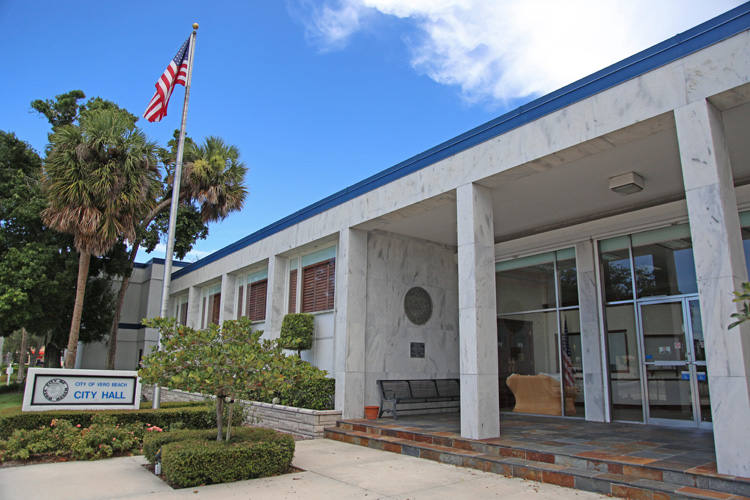Despite some opposition to residential development on Vero’s riverfront utility parcels, the Vero Beach City Council has unanimously approved a Three Corners Master Concept Plan that includes apartments and condos – but the required charter change to build the project likely won’t make it onto the November ballot.
The council voted April 26 on a plan recommended by the Three Corners Steering Committee that features a waterfront promenade, shops, restaurants, green space, a splash park, a cultural event venue, day docks and hopefully a hotel – either using the Big Blue power plant structure, or tearing it down if repurposing it isn’t feasible.
“Everyone wanted to go back to this drawing,” said Vero Planning Director Jason Jeffries, referring to an early, pre-pandemic design for the site of the city’s decommissioned electric plant. “This is the thing that everyone liked, going back to this design coming out of the original charrettes, the so-called ‘standing ovation plan.’
“The key thing is the retention of the ability of the public to use this space,” Jeffries added.
“This is open to the community. This is the destination you’re trying to create.”
Councilmembers rejected a more recent, scaled-down plan proposed by architect Andres Duany of DPZ CoDesign, who assumed the city would need to dial down its expectations due to the pandemic.
The next step is to determine the fiscal feasibility of the approved plan and reckon the chances the plan might have in the market. For that, Vero has commissioned a study by a financial consulting firm.
How much the PFM consulting firm will charge for the study is unknown, but City Manager Monte Falls was given permission to spend up to $50,000 to get things rolling.
The study will examine how much the recreational amenities of the plan might cost to construct and maintain, and what appetite there is in the market for developing the commercial aspects of the project, including the hotel, retail shops and restaurants.
The study is expected to take a couple of months. Depending on the results and what changes might need to be made to the design based on cost or market feasibility factors, a final plan and report could materialize a few weeks after that.
That timeline puts the process into late July or early August – if everything happens quickly.
“Is it possible to get it to referendum this year?” Councilman Dick Winger asked.
“Time is getting short,” Jeffries said.
City Manager Monte Falls added, “We’re basically the first of June right now. We have to have that language to the Supervisor of Elections by … the third week of August. So that gives us less than 90 days. So, is it possible? Maybe. Is it probable? I would say probably not.”
Falls’ goal is for the project to be “revenue neutral” so the city does not need to dip into $21 million in residual profits from the electric utility sale that created the huge redevelopment opportunity on the riverfront.
That means the lease income from the hotel, retail and commercial portions of the development would need to pay for recreational amenities the city wants to build.
That’s why the steering committee included limited residential development – apartments or condos over businesses – to help boost revenue from the project. Several council members oppose having people live on what will remain public property.

